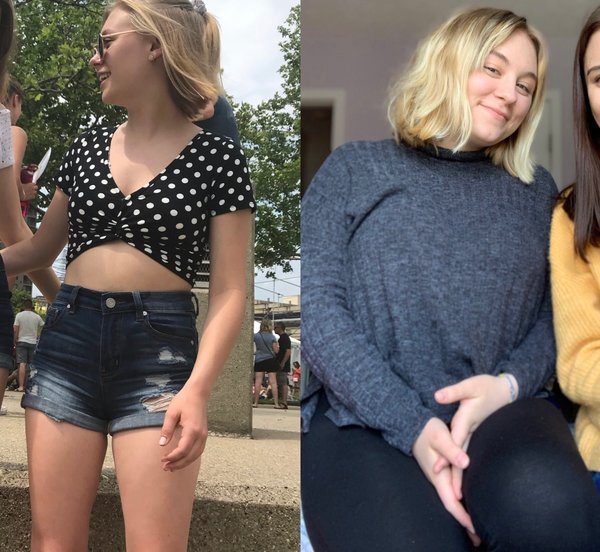On a daily basis, I stand in front of my full-length mirror in my underwear picking my body apart flaw-by-flaw. I chastise myself for having eaten a cookie yesterday afternoon. I regret not skipping dinner. I scrutinize the fact that my hipbones protrude just a little bit farther than I wish they would. I loathe every dimple and defect about my outward appearance.
Just the thought of my 5'6", 120-pound frame makes me hate every square inch of my body.
To put it simply: I have an unhealthy obsession with wanting to be skinny.
Unfortunately, I'm not the only 20-year-old woman who does.
According to the Walden Center for Education and Research, at some point in their college career, 40% of females will have had an eating disorder of some sort, and 91% of college-age women will have used some form of dieting within their time at a university.
But why?
Of course, I can't speak for everyone, but I would guess that the insecurities that fuel my restrictive eating habits parallel those of the other 20 million women who suffer every day from intense hunger, food deprivation and binging and purging.
The more I've thought about it, the more I've realized that my need for control might be an influence on my eating habits. In college, students constantly undergo significant life changes and transitions, and it becomes easy to cling to things that can be controlled -- eating being one of those few things. I know I get sincere comfort out of the fact that my eating habits are completely subject to my wants and needs and are not dependent on any of the many changing variables in my life.
In addition to my intense need for control comes the horrors of social media.
I constantly find myself scrolling through images of other girls my age, comparing myself in every way possible.
Her legs are so skinny. I wish I had a thigh gap.
I wish I had a flatter stomach like that.
I want her small arms and thinly framed shoulders.
Instagram and Pinterest make it almost impossible for me to feel good about myself, and it causes my self-loathing to spiral out of control. It's gotten so bad that, at times, I've only eaten one meal a day for weeks at a time before I nearly have a psychotic break out of pure starvation. Last fall, I dropped 15 pounds quicker than I ever should have. This school year so far, I've fervently struggled with my eating and emotions. If I eat, I hate myself, but if I don't eat, I'm hungry.
It's a fight that my brain can't handle, and one I can never win.
Thankfully, I have the support of my closest friends, one who can relate on an incredibly personal level.
One of my best friends Katie struggled with Anorexia from the age of 18-20. Before her freshman year of college, Katie began losing weight, wanting to make the most of her "fresh start."
Losing weight then became an addiction.
"I began obsessively weighing myself, and, eventually, I got afraid of certain foods," Katie said.
At some points, she wasn't eating more than 800 calories a day.
"Eating disorders really are a sickness, and they can become uncontrollable."
Unfortunately, eating disorder rates are on the rise, and Katie and I believe it's due to the unrealistic expectations among college students, and the amount of competition among females, in particular. We get so wrapped up in our image that we can't ignore what others think and focus solely on what we think of ourselves.
I truly believe that we, millennials, have forgotten how to love ourselves.
So how do we change that?
I'm not going to head into a spiel about loving yourself and how beautiful you really are, because, in reality, if you have problems with your body image, that's not going to change just because I say it should. (Trust me, I know from firsthand experience.)
What I am going to say is that there are an infinite amount of resources out there to support those of us who struggle every single day.
To schedule an appointment through SMU, visit the counseling services website.



















